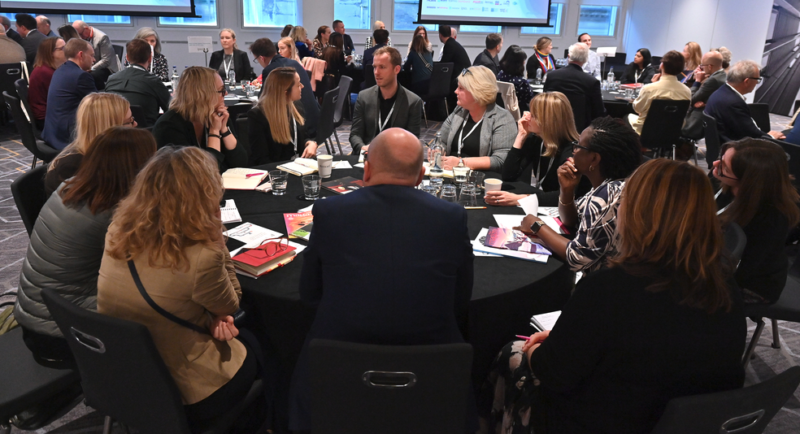The message was stark at the PPA IndPub conference for independent B2B and consumer specialist publishers. Harsh economic headwinds are blowing, and digital subscriptions may be the route to survival for smaller publishers. But there are still opportunities to flourish and practical tips to test out.
Economic challenges but also opportunities for specialist publishers
According to Enders Analysis, advertising spend is likely to be a little soft for a couple of years as company confidence dips. Of more concern to magazine publishers, print’s share of total ad spend will continue to decline fast, falling to as low at 1% by 2026. While digital offerings from publishers will barely maintain their share of overall ad spend.
All publishers must speed up both their digital transition and invest in subscriptions to maintain or have a hope of growing their revenues. The good news is that the audience of specialist consumer media is biased to the over 50s, who are more insulated from the cost-of-living crisis and also tend to renew at a higher rate than younger cohorts.
The decline of third-party cookies puts greater emphasis on first party data, another reason to invest in direct relationships, digital registration, and subscriptions.
What works in subscriptions and membership
London Review of Books is a subscription success story, doubling its paid print subscribers since 2001 to over 92,000. Their newsletter reaches 165k with click through rates over 16%. Publisher Renee Doegar is very focussed on segmenting the database, and creating targeted email newsletters for each segment, separating paid subscribers from prospects. She also believes in lots of testing.
Her key tip was to decide what action you want the recipient to take, whether that is going to the website or buying a gift subscription and tailoring the content of the newsletter with that in mind.
Consider how you can repackage your content. LRB has developed a series of collectable books, promoted to subscribers, which are easy to produce, contribute profit and also entrench the brand for buyers and readers.
Travel Trade Gazette (TTG Media) had always been ad-funded but started experimenting with digital registration and paid membership in 2020. Their packaging and pricing has gone through several iterations (we could call it testing). The most recent splits their audience into agents (who qualify for a lower rate) and travel suppliers (who pay more).
CEO Daniel Pearce explained his key learnings were to keep the packages simple and communicate the emotional message to the audience: “join our mission for smarter, better, fairer travel industry”.
How to price your digital content
In a volatile environment, publishers need to up their pricing game. Smart pricing strategies can transform your bottom line. Instead of relying on cost plus pricing, it pays to investigate the value your content creates for your readers, whether they are sports lovers, hobby enthusiasts, or ambitious business executives. Then set your pricing closer to the value you are creating.
Segment your audience and offer different packages and prices, either according to the category they fall in, or by offering a range of packages so they can self-select. In B2B markets, company or enterprise packages are a great way to grow revenue per customer.
Richard O’Connor, CEO of B2B Marketing, shared their journey from a content subscription and a separate series of conferences, to becoming a “community intelligence” businesses. The core of their business is Propolis, a 365/24/7 community of B2B marketing experts, whose content is augmented by contributions from members and featured at events.
B2B Marketing’s pricing is based around the size of the business, with four tiers. The entry level is £11k and the average paid is £16k. This provides the entire marketing team with access to the Propolis community and their events. A small amount of teaser content is left outside the paywall, and non-members can buy one-off tickets to events, so they can sample the quality of the content – but not participate in the community.
Further reading on subscriptions and membership
https://speciall.media/2022/09/14/customer-value-in-b2b-subscriptions/
https://speciall.media/2022/08/25/converting-individual-subs-to-enterprise-subs/
https://speciall.media/2022/03/23/building-a-membership-business/
Challenges and opportunities for specialist publishers
An attribute of the indie publisher community is a willingness to share advice and best practice. These were some of the challenges and solutions overheard in coffee queues and discussed at round tables.
- How to deal with rising print and paper prices? Tweak the format, rotate circulation to different groups, review frequency
- Alternatives to WHS for niche publications? Explore specialist distribution, build partnerships in your sector, or use digital communities to drive print subscriptions
- Poor take-up of PDF page-turner? Consider a feed-based mobile friendly digital edition. Steal ideas from digital native media brands like The Athletic and Tortoise.
- How to hire journalists when local papers are decimated? Use the appeal of your content – advertise for a “Travel writer” or a “Rugby reporter” not an editorial assistant
- Making hybrid working work? Try to have fixed in office days each week to encourage teams to collaborate face to face. Provide small quiet spaces for zoom calls in the office. Plan more company days and provide free food.
- Reaching more people with a podcast? Choose your host carefully. Spend as much on the marketing as you did on the production. Have a dedicated podcast website. Put your podcast on every platform. Use episode descriptions for SEO.
If you’d like to discuss your subscription or membership strategy over a real or virtual coffee, or would like a copy of my presentation on How to Price your Content, do get in touch.
About the author
Carolyn Morgan has acquired, launched, built, and sold specialist media businesses in print, digital and events. She now advises niche consumer and B2B publishers on developing new products and digital revenue streams as a consultant and NED.
Find out more about the advice we provide for publishers

